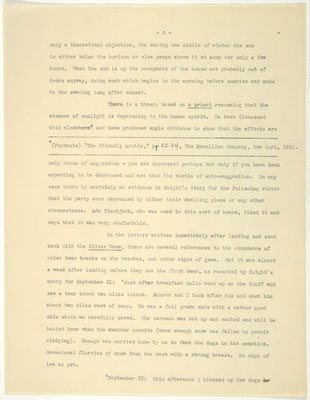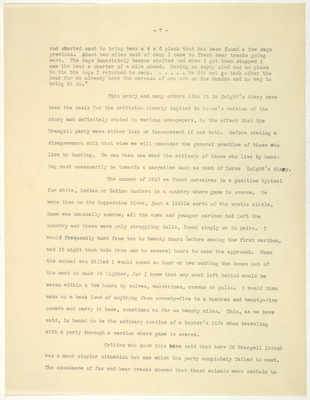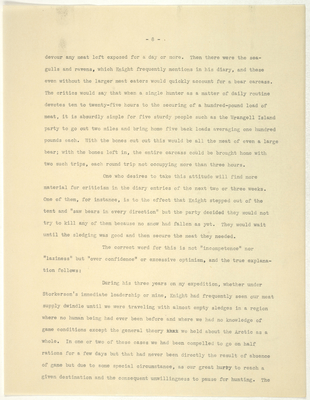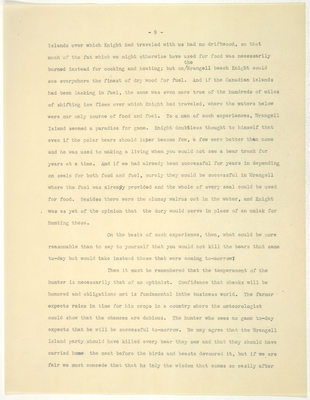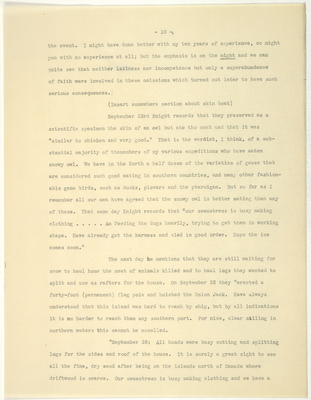Pages
stefansson-wrangel-09-25-006-006
- 6 -
only a theoretical objection, for during the middle of winter the sun is either below the horizon or else peeps above it at noon for only a few hours. When the sun is up the occupants of the house are probably out of doors anyway, doing work which begins in the morning before sunrise and ends in the evening long after sunset.
There is a theory based on a priori reasoning that the absence of sunlight is depressing to the human spirit. We have discussed this elsewhere* and have produced ample evidence to show that the effects are
_____ *(Footnote) "The Friendly Arctic," pp-22-24, The Macmillan Company, New York, 1921. _____
only those of suggestion - you are depressed perhaps but only if you have been expecting to be depressed and are thus the victim of auto-suggestion. In any case there is certainly no evidence in Knight's diary for the following winter that the party were depressed by either their dwelling place or any other circumstance. Ada Blackjack, who was used to this sort of house, liked it and says that it was very comfortable.
In the letters written immediately after landing and sent back with the Silver Wave, there are several references to the abundance of polar bear tracks on the beaches, and other signs of game. But it was almost a week after landing before they saw the first bear, as recorded by Knight's entry for : "Just after breakfast Galle went up on the bluff and saw a bear about two miles inland. Maurer and I took after him and shot him about two miles west of camp. He was a full grown male with a rather good skin which we carefully saved. The carcass was cut up and cached and will be hauled home when the weather permits (when enough snow has fallen to permit sledging). Enough was carried home by us to feed the dogs in the meantime. Occasional flurries of snow from the vrest with a strong breeze. No sign of ice as yet.
": This afternoon I hitched up the dogs be
stefansson-wrangel-09-25-006-007
- 7 -
and started east to bring back a 4 x 6 plank that had been found a few days previous. About two miles east of camp I came to fresh bear tracks going east. The dogs immediately became excited and when I got them stopped I saw the bear a quarter of a mile ahead. Having an empty sled and no place to tie the dogs I returned to camp . . . . . We did not go back after the bear for we already have the carcass of one out on the tundra and no way to bring it in."
This entry and many others like it in Knight's diary have been the basis for the criticism clearly implied in Noice’s version of the story and definitely stated in various newspapers, to the effect that the Wrangell party were either lazy or incompetent if not both. Before stating a disagreement with that view we will consider the general practice of those who live by hunting. We can then see what the attitude of those who live by hunting must necessarily be towards a narrative such as that of Lorne Knight's diary.
The summer of we found ourselves in a position typical for white, Indian or Eskimo hunters in a country where game is scarce. We were then on the Coppermine River, just a little north of the arctic circle. Game was unusually scarce; all the cows and younger caribou had left the country and there were only straggling bulls, found singly or in pairs. I would frequently hunt from ten to twenty hours before seeing the first caribou, and it might then take from one to several hours to make the approach. When the animal was killed I would spend an hour or two cutting the bones out of the meat to make it lighter, for I knew that any meat left behind would be eaten within a few hours by wolves, wolverines, ravens or gulls. I would then make up a back load of anything from seventy-five to a hundred and twenty-five pounds and carry it home, sometimes as far as twenty miles. This, as we have said, is bound to be the ordinary routine of a hunter's life when traveling with a party through a section where game is scarce.
Critics who know this hive said that here in Wrangell Island was a much simpler situation but one which the party completely failed to meet, ihe abundance of fox and bear tracks showed that these animals were certain to
stefansson-wrangel-09-25-006-008
- 8 -
devour any meat left exposed for a day or more. Then there were the seagulls and ravens, which Knight frequently mentions in his diary, and these even without the larger meat enters would quickly account for a bear carcass. The critics would say that when a single hunter as a matter of daily routine devotes ten to twenty-five hours to the securing of a hundred-pound load of meat, it is absurdly simple for five sturdy people such as the Wrangell Island party to go out two miles and bring home five back loads averaging one hundred pounds each. With the bones cut out this would be all the meat of even a large bear; with the bones left in, the entire carcass could be brought home with two such trips, each round trip not occupying more than three hours.
One who desires to take this attitude will find more material for criticism in the diary entries of the next two or three weeks. One of them, for instance, is to the effect that Knight stepped out of the tent and "saw bears in the every direction" but the party decided they would not try to kill any of them because no snow had fallen as yet. They would wait until the sledging was good and then secure the meat they needed.
The correct word for this is not "incompetence" nor "laziness" but "over confidence" or excessive optimism, and the true explanation follows:
During his three years on my expedition, whether under Storkerson's immediate leadership or mine, Knight had frequently seen our meat supply dwindle until we were traveling with almost empty sledges in a region where no human being had ever been before and where we had no knowledge of game conditions except the general theory xxxx we held about the Arctic as a whole. In one or two of these cases we had been compelled to go on half rations for a few days but that had never been directly the result of absence of game but due to some special circumstance, as out great hurry to reach a given destination and the consequant unwillingness to pause for hunting. The
stefansson-wrangel-09-25-006-009
- 9 -
islands over which Knight had travelled with us had no driftwood, so that much of the fat which we might otherwise have used for food was necessarily burned instead for cooking and heating; but on the Wrangell beach Knight could see everywhere that finest of dry wood for fuel. And if the Canadian islands had been lacking in fuel, the same was even more true of the hundreds of miles of shifting ice floes over which Knight had traveled, where the waters below were our only source of food and furl. To a man of such experiences, Wrangell Island seemed a paradise for game. Knight doubtless thought to himself that even if the polar bears should later become few, a few were better than none and he was used to making a living when you would not see a bear track for years at a time. And if we had already been successful for years in depending on seals for both food and fuel, surely they would be successful in Wrangell where the fuel was already provided and the whole of every seal could be used for food. Besides there were the clumsy walrus out in the water, and Knight was as yet of the opinion that the dory would serve in place of an umiak for hunting these.
On the basis of such experiences, then, what could be more reasonable than to say to yourself that you should not kill the bears that came to-day but would take instead those that were coming to-morrow?
Then it must be remembered that the temperament of the hunter is necessarily that of an optimist. Confidence that checks will be honored and obligations met is fundamental inthe businsess world. The farmer expects rains in time for his crops in a country where the meteorologist could show that the chances are doubious. The hunter who sees no game to-day expects that he will be successful to-morrow. We may agree that the Wrangell Island party should have killed every bear they saw and that they should have carried home the meat before the birds and beats devouvered it, but if we are fair we must concede that that hs inly the wisdom that comes so easily after
stefansson-wrangel-09-25-006-010
- 10 -
the event. I might have done better with my ten years of experience, so might you with no experience at all; but the emphasis is on the might and we can quite see that neither laziness nor incompetence but only a superabundance of faith were involved in these omissions which turned out later to have such serious consequences.
(Insert somewhere section about skin boat)
September 23rd Knight records that they preserved as a scientific specimen the skin of an owl but ate the meat and that it was "similar to chicken and very good." That is the verdict, I think, of a substantial majority of themembers of my various expeditions who have eaten snowy owl. We have in the North a half dozen of the varieties of geese that are considered such good eating in southern countries, and many other fashionable game birds, such as ducks, plovers and the ptarmigan. But so fas as I remember all our men have agreed that the snowy owl is better eating than any of these. That same day Knight records the "our seamstress is busy making clothing ..... Am feeding the dogs heavily, trying to get them in working shape. Have already got the harness and sled in good order. Hope the ice comes soon."
The next day he mentions that they are still waiting for snow to haul home the meat of animals killed and to haul logs they wanted to split and use as rafters for the house. On September 25 they "erected a forty-foot (permanent) flag pole and hoisted the Union Jack. Have always understood that this island was hard to reach by ship, but by all indications it is no harder to reach than any southern port. For nice, clear sailing in northern waters this cannot be excelled.
"September 26: All hands were busy cutting and splitting logs for the sides and roof of the house. It is surely a great sight to see all the fine, dry wood after being on the islands of north Canada where driftwood is scarce. Our seamstress is busy making clothing and we have a
